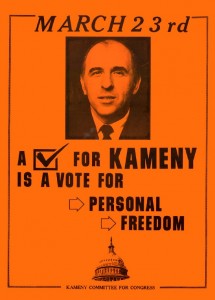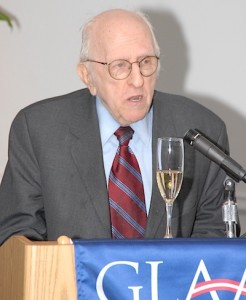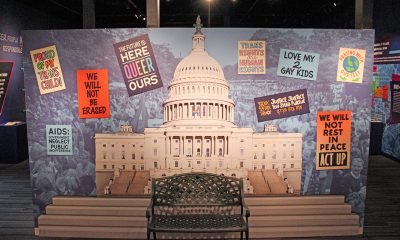Living
GLAA celebrates 40 years
Activists move from the street to the suite after 4 decades of work

Frank Kameny remembers seeing Paul Kuntzler, his campaign manager on a 1971 bid for Congress, walk into Temple Sinai on Military Road in Washington with large reams of paper rolled under each arm and an elated look on his face.
Kameny, who founded the gay liberation movement in D.C. after being fired from the federal government in 1957, needed 5,000 signatures to get on the ballot. With the late February deadline looming, the group only had about 1,300. Realizing outside help was needed, Kameny and Kuntzler thought a gay group in New York whom they found to be one of the few “getting much of anything done,” as Kameny puts it, might be able to help. The group — Gay Activists Alliance of New York — sent two busloads of people to blanket the District one Sunday afternoon to secure signatures.

A vintage 'Kameny for Congress' poster from 1971. This campaign inspired the launch of GLAA. (Image courtesy of Rainbow History Project)
A dance was held that night at the Temple and when Kuntzler arrived, the group knew it was home free. They had about 7,700 signatures — plenty to get Kameny on the ballot. The “Kameny for Congress” campaign ended with the candidate coming in fourth in a six-way race. Though he lost, the 1,900 votes he secured while running as a then-unheard-of openly gay candidate, galvanized local activists.
Kameny’s own Mattachine Society was fading as members began to find its formality anachronistic in the Vietnam era. And the D.C. Gay Liberation Front was too radical for some others. The Kameny campaign activists were so impressed with the GAA New York group, they used about $400 left in their coffers after the election to visit the Big Apple and find out how the group operated.
By about the third week in April, a D.C. chapter was formed in the apartment of Jim McClard, the local group’s first president. While the New York group folded about a decade later, Washington’s Gay Activist Alliance is celebrating its 40th anniversary this month (in 1986 then-president Lorri Jean — now head of Los Angeles’ mammoth LGBT Community Center — insisted on changing the name to Gay and Lesbian Activists Alliance, or GLAA as it is commonly known). It’s the oldest continuously active gay organization in the country.
The group celebrates Wednesday at the Washington Plaza Hotel in Thomas Circle. Kameny, now 85, will give his founder’s Champagne toast, as has become GLAA tradition. And the group will bestow its annual Distinguished Service Awards to six local activists. Minimum donations are $50. Visit glaa.org for more information.
Kameny says the group — which lists pages of political gains on its website — has thrived under strong leadership.
“Some of it has been sheer good luck,” he said. “Throughout the ’70s, ’80s and beyond, the group had a string of presidents who were absolutely superb. I said that frequently back then and I still say it. One after another, there were just a lot of great people. There may have been one or two duds, but they really had good people, good officers who kept the organization going. They kept it effective and were very dedicated.”
The group’s first effort was also its only formal collaboration with Mattachine and the local Gay Liberation Front — a protest of the 1971 American Psychiatric Association’s convention held that year in Washington. Though GLAA disavowed the use of force and worked to “act within the existing order,” that first effort involved storming the conference and seizing the microphone in an effort to convince APA brass that gays were not mentally ill.
“We couldn’t possibly be trusted with government secrets and security clearances if we were mentally disturbed,” Kameny said.
He chuckles at the tactics now and says the groups soon went in their own direction — GLAA with Robert’s Rules of Order for its meetings, a gay-specific focus and a strong commitment to non-partisanship.
“I used to attend the GLF meetings,” Kameny said. “They seemed to just drone on endlessly and you had the impression there was a small group meeting in the attic who really ran things. And they tried to tie in all the issues of the day. My feeling has always been if you try to do everything you end up doing nothing very well.”
Former president Craig Howell, who joined in 1973 and has been active ever since, admits the heavily political nature of the group’s work limits its appeal, but said its track record over 40 years speaks for itself.

The late Jeff Coudriet, a former GLAA president, speaks at the group's 2007 awards. (Blade file photo by Henry Linser)
“There’s always been a small number doing most of the work,” Howell said. “Many times we’d just be sitting there in the living room on [former president] Bob Carpenter’s couch. If we had four or five at a meeting, that was considered good. It’s always been very wonky, so that makes for limited people, but the devil is in the details and you have to go through that trivia to get what you want. But it’s worth paying the price.”
The group counts among its victories:
• Council’s 1973 passage of Title 34, which made Washington the first major U.S. city to outlaw discrimination against gays in housing, employment and public accommodations.
• Kameny’s 1975 appointment to the city’s Human Rights Commission, a first
• A 1978 gay rights rally, the largest of its kind to that time, to protest anti-gay singer Anita Bryant
• A 1979 public service campaign that required a court fight to allow “Someone you know is gay” posters to be placed at Metro stations
• Former president Mel Boozer’s 1980 speech at the Democratic National Convention
• Repeal of D.C.’s sodomy law in 1981
• A 1982 commitment from D.C. police for fair treatment of gays
• A 1986 Council bill that prohibited insurance companies from denying coverage to HIV-positive residents
• 1990 hate crimes legislation
• A 1992 domestic partnership bill
• A 1999 settlement in the Tyra Hunter case, a trans resident who was shunned and ridiculed by EMS workers following a car accident. She died in 1995.
• Part of a broad coalition that opposed an exception from the D.C. Department of Corrections from requirements in the D.C. Human Rights Act in 2008
• Marriage for same-sex couples in 2009
Current president Mitch Wood says the group is “really a labor of love” and that its non-partisan nature “allows us to build bridges across the political spectrum.”
It’s all volunteer and operates on a small budget of about $10,000 per year, most of which goes to maintain its website and blog and stage its annual awards reception. Money comes from nominal member dues — $25 per year — and ticket sales and donations. The group meets twice monthly for about 90 minutes, mostly at the Charles Sumner School but sometimes at the Wilson building. Meetings are usually followed by dinner and drinks, often at Dupont Italian Kitchen. New members are always welcome.
Among GLAA’s signature work is its candidate ratings. Members always point out the ratings should not be seen as endorsements, but they rank those running for local office based on questionnaire responses and members’ knowledge of the candidates’ records on gay issues, to rank them on a scale that runs from -10 to +10.
“Usually in every election cycle somebody working with one of the candidates or another gets unhappy that so-and-so didn’t get a high enough rating,” Rick Rosendall, the group’s vice president for political affairs and a former president, says. “So they’ll make some snarky comments, but because we back up so thoroughly how we arrive at our ratings, we can show the point breakdowns and their responses to the questions, so they know what went into the ratings. It’s a very open process, not some beauty contest score with us up in some ivory tower.”
Over the years, the group’s ratings gained heft. Though he notoriously voted against the marriage bill, Council member Marion Barry initially scored a -10 during his run for mayor in the early ’80s. The low score led him to work with the local gay community and for years he was seen as a supportive public official.
Rosendall said the group’s decades of groundwork pays off even in unlikely places. He cites the two Council members — Barry and Yvette Alexander — who voted against marriage, and also Council member Harry Thomas Jr., who opposed the infamous club relocation bill for gay bars in 2007.
“They’ve all at various times emphasized their pro-gay credentials,” Rosendall said. “Even though Barry did speak at one of Bishop [Harry] Jackson’s rallies in Freedom Plaza, it was a far cry from the hateful rhetoric you hear from state legislators. … And GLAA can take some of the credit for that, but the community has played a key role in this as well. … It’s not just a handful of policy wonks, it’s our community who has been active in this city since before home rule.”
Gay D.C. Council member Jim Graham, who’s received many perfect scores from the group, said he respects GLAA even when he occasionally disagrees with members.

Frank Kameny giving his traditional GLAA toast at the group's 2007 awards. (Blade file photo by Henry Linser)
“They put an enormous amount of sincere effort into it,” Graham said. “I mean they really do. It’s not anything they do in a casual way. And most recently I’ve been getting pretty much 10s, so you’re always happy with a perfect score.”
Rosendall says one big change over the years has been what he calls “street versus suite” activism. The group has moved away from demonstrations largely because it’s usually given a seat at the discussion table.
“As you get more power and influence, there’s less need to be standing outside,” he said. “That doesn’t mean there isn’t a place for groups like GetEqual. Different groups are good at different things. I like to say we’re working different parts of the vineyard.”
The group has, at times, faced criticism. Within the last four years or so, some activists, including Michael Crawford, said the group wasn’t moving fast enough on the marriage issue.
Rosendall said GLAA prides itself on avoiding excessive intramural fighting among other local activist groups.
“We really try not to let things deteriorate too much into personality and battles we don’t need,” he said. “We’ve tried to keep our collective eyes on the prize and the marriage victory demonstrated that. There’s no way we would have been doing all this policy work and building coalitions if we weren’t wanting it to happen. We just wanted to make sure it stuck.”
Graham said the group deserves praise for its tenacity, especially considering the era in which it launched.
“It’s difficult to imagine how very important and pioneering they were back in 1971,” Graham said. “In this day and age when we’ve made such progress, it’s important that we pause and acknowledge those who were there 40 years ago at a time when things were so very different. … The young men and women in our community really need to stop and realize this. We’re here because of these folks.”

As the days grow longer and buyers re-emerge from winter hibernation, the spring market consistently proves to be one of the strongest times of year to sell a home. Increased inventory, motivated buyers, and picture-perfect curb appeal make it a prime window for homeowners ready to list.
The good news? Preparing your home for spring doesn’t require a full renovation or a contractor on speed dial. A few thoughtful, cost-effective updates can dramatically elevate your home’s appeal and market value.
Here are smart, inexpensive ways to get your property market-ready:
Fresh Paint: The Highest Return on a Small Investment
Few improvements transform a home as quickly and affordably as paint. Neutral tones remain the gold standard, but today’s buyers are gravitating toward warmer tan hues that create an inviting, elevated feel without overwhelming a space. Soft sandy beiges and warm greige-leaning tans provide a clean backdrop that photographs beautifully and allows buyers to envision their own furnishings in the home.
Freshly painted walls signal care and maintenance — two qualities buyers subconsciously look for when touring properties.
Removable Wallpaper: Style Without Commitment
For homeowners wanting to introduce personality without permanence, removable wallpaper offers a stylish solution. A subtle textured pattern in a powder room, a soft botanical print in a bedroom, or a modern geometric accent wall can add depth and character. Because it’s easily removed, it appeals to both sellers and buyers — creating visual interest without long-term risk.
Upgrade Light Fixtures for Instant Modernization
Outdated lighting can age a home instantly. Swapping builder-grade fixtures for modern, streamlined options is one of the simplest ways to refresh a space. Consider warm metallic finishes or matte black accents to create a cohesive, updated look. Proper lighting not only enhances aesthetics but also ensures your home feels bright and welcoming during showings.
Elevate Curb Appeal: First Impressions Matter Most
Spring buyers often decide how they feel about a home before they ever step inside. Refreshing curb appeal doesn’t require major landscaping. Simple updates such as fresh mulch, trimmed shrubs, seasonal flowers, a newly painted front door, and updated house numbers can dramatically improve first impressions. Power washing the driveway and walkways also delivers a clean, well-maintained appearance for minimal cost. Even if you don’t have a curb to appeal- think potted plants on your patio, balcony and change out your door mat.
Deep Clean & Declutter (Seriously, It Matters)
A deep, top-to-bottom cleaning is basically free and one of the most impactful things you can do. Scrub floors, windows, grout, baseboards, appliances, bathrooms, and everything in between. Don’t forget to clean windows inside and out — natural light is a huge selling point. Declutter by packing up excess stuff, clearing off countertops, and minimizing personal items so buyers can see the space, not your life.
Let the Light Shine
Make your home feel bright and inviting by cleaning windows, opening blinds, and replacing dark or dated light fixtures with contemporary, budget-friendly options. Swapping in LED bulbs offers brighter light and lower utility costs — a small change that buyers appreciate. Pro tip: I always recommend removing widow screens to allow as much light in as possible
Neutralize Scents
Make sure the home smells fresh. Neutralizing odors — whether from pets, cooking, or moisture — creates a clean, welcoming atmosphere. Light natural scents like citrus or subtle florals can be inviting during showings. Think of how your favorite hotel smells and go for that.
Spring market rewards preparation. By focusing on high-impact, low-cost improvements, sellers can position their homes to stand out in a competitive environment. With thoughtful updates and strategic presentation, homeowners can maximize both buyer interest and potential sale price — all without overextending their renovation budget.
As activity increases and inventory begins to rise, now is the time to prepare. A little polish today can translate into significant results tomorrow.
Justin Noble is a Real Estate professional with Sotheby’s International Realty Servicing Washington D.C., Maryland, and the beaches of Delaware.
Advice
Dry January has isolated me from my friends
Is it possible to have social life without alcohol?

Dear Michael,
Some of my friends and I decided to do Dry January.
The six of us are a posse, we’ve been friends for years. Many boyfriends and even a husband or two have come and gone but we get together all the time and travel together.
I think we all agreed that drinking is too big a part of our social lives and thought we’d give Dry January a shot.
So … I am feeling better and it’s only been three weeks.
I’ve actually lost a little weight, and it’s nice not to wake up with a hangover four mornings a week. I’m pushing 40 and no surprise, my body feels relieved.
But, I’m also the only one of us who is still doing it.
Which means they are all going out and I am not. So I am feeling lonely.
I could join them in going out but first of all, I don’t really want to hang out with them when they’re drunk and I’m trying to be alcohol free; and also, there’s a part of me that is afraid I will give in to temptation and have a drink. And then it will be back to business as usual.
But, I spent this past weekend, and every night this week, alone.
All of this has me thinking: what do I do in February? I really don’t want to start drinking again.
But, if I don’t, how do I stay part of my friend group? If they’re buzzed (or drunk) and I’m not, am I still going to fit in?
I’m disappointed in my friends. We were all in this together, I thought, but one thing after another came up for them.
Some special event where “everyone was drinking,” a work dinner where “I didn’t want to deal with everyone’s questions about why I wasn’t drinking,” “too much work stress not to have a martini,” etc. In the end they were all laughing about it and now they’re basically poking fun at me and essentially betting how long I will last. That doesn’t feel good. It’s like the whole thing was a whim or a joke to them.
Also, heavy alcohol use is pretty typical of our community. If I’m not drinking then how do I have a social life?
Appreciate your thoughts.
Michael replies:
It can be hard to be different. For example, to be gay in a straight world, or not to drink in a world where alcohol plays such a big part.
I’m a believer in living in a way that respects whom you actually are. This means doing what you think is important to do, even when there are consequences you don’t like. Only you can decide the boundary where the consequences of your living with integrity become intolerable.
Yes, many gay men drink a lot. So if you decide you don’t want to hang out where alcohol is involved, you will be reducing your options for socializing.
Some possibilities:
- Discuss this situation with your friends. Ask them if they’re willing to spend some time with you and without alcohol. (Not all the time — that would be way too much to ask, given that they clearly enjoy drinking.) Perhaps if you explain why your request is important to you, they’ll be willing to lean in your direction at least some of the time. That they’re now mocking you for not drinking suggests I am a bit too optimistic about this possibility. But who knows? And, what have you to lose by asking?
- See if you can tolerate hanging out with people who are drinking without picking up a drink yourself, and if you can actually enjoy such interactions.
- Start looking for some new friends. There are, in fact, lots of gay men in this world whose social lives don’t revolve around alcohol (or other substances.)
On a separate but related note: given your fear that you will start drinking again, and your concerns about navigating life without alcohol, might you consider Alcoholics Anonymous to get some support?
I’ve seen AA and other 12-step groups help many friends and clients, and I think they work in two main ways.
First, attending meetings gives you support and a feeling of community. You’ll meet others who are working to be sober, hear their stories and share your own struggles with them. You’re likely to feel less alone in your effort to stop drinking, learn tools for staying sober, and make friends you can reach out to when you’re feeling vulnerable. You’ll also have a sponsor, your guide and advocate in the program, whom you talk with regularly.
Second, the program lays out “12 steps” of recovery that are a path to greater self-awareness and personal growth. Like good psychotherapy, the steps give you a framework for looking at your behavior patterns and taking responsibility for yourself.
If you are intrigued, the best way to learn more is to attend several 12-step meetings. There are many in our area, including gay groups (for example, the Triangle Club.) As I mentioned, if you do get involved in AA, a side benefit is that you’re likely to make some new friends who share your desire to build a life without alcohol.
Of course, making new friends does not have to mean cutting off your posse. But if you’re changing in ways that make them less of a great fit, it would be great to find some new folks who might be more on your wavelength to connect with.
Michael Radkowsky, Psy.D. is a licensed psychologist who works with couples and individuals in D.C., Maryland, Virginia, and New York. He can be found online at michaelradkowsky.com. All identifying information has been changed for reasons of confidentiality. Have a question? Send it to [email protected]
Real Estate
2026: prices, pace, and winter weather
Lingering snow cover, sub-freezing temperatures have impacted area housing market

The D.C. metropolitan area’s housing market remains both pricey and complex. Buyers and sellers are navigating not only high costs and shifting buyer preferences, but also seasonal weather conditions that influence construction, inventory, showings, and marketing time.
Seasonality has long affected the housing market across the U.S. Activity typically peaks in spring and summer and dips in winter; however, January and February 2026 brought unusually cold spells to our area, with extended freezing conditions.
Persistent snow and ice-covered roads and sidewalks have gone for days, and in some cases weeks, before melting. While snow accumulation normally averages only a few inches this time of year, this winter saw below-normal temperatures and lingering snow cover that has significantly disrupted normal activity.
Rather than relying on neighborhood teenagers to shovel snow to make some extra money, the “snowcrete” has required ice picks, Bobcats, and snow removal professionals to clear streets and alleys, free our cars from their parking spaces, and restore availability of mass transit.
These winter conditions have had an adverse impact on the regional housing market in several ways.
- Construction slowdown: New builds and exterior improvements often pause during extended cold, resulting in delayed housing starts when we need affordable housing in the worst way.
- Listing preparation: Cleaning crews, sign installers, photographers, and stagers with trucks full of furniture may be unable to navigate roads and need to postpone service.
- Showings and open houses: Simply put, buyers are less inclined to schedule visits in hazardous conditions. Sellers must ensure walkways and parking areas are clear and de-iced and be able to vacate the property while viewings are taking place.
- Inspection and appraisal delays: Like buyers and sellers, ancillary professionals may be delayed by unfavorable weather, slowing timelines from contract to close.
- Maintenance and repairs: Properties with winter damage (e.g., ice dams or frozen pipes) may experience repair delays due to contractor availability and supply chain schedules. Snow and cold can also affect properties with older and more delicate systems adversely, leading some sellers to delay listing until better conditions arrive.
- Availability of labor: Increasingly, construction, landscaping, and domestic workers are reluctant to come into the District, not because of ice, but because of ICE.
Overall, the District has shown a notable increase in days on the market compared with past years. Homes that once sold in a week or less are now often listed for 30+ days before obtaining an offer, especially in the condominium and mid-range house segments. While part of this shift can be attributed to weather and climate, interest rates, uncertain employment, temporary furloughs, and general economic conditions play key roles.
Nonetheless, we continue to host some of the region’s most expensive residences. Historic estates, including a Georgetown mansion that sold for around $28 million, anchor the luxury segment and reflect ongoing demand for premium urban property.
But even in this high-end housing sector, marketing strategies are evolving based on seasonal realities. Price reductions on unique or niche properties, such as undersized or unconventional homes, reflect a broader market adjustment where competitive pricing can shorten selling time.
For example, a beautifully renovated, 4-story brick home with garage parking and multiple decks that overlook the Georgetown waterfront sold in early February for 90 percent of the list price after 50 days on the market.
At the other end of the spectrum, a 2-bedroom investor-special rowhouse in Anacostia only took eight days to sell for under $200,000, down 14 percent from its original list price. In addition, four D.C. homes took more than 250 days to sell, including an 8-bedroom rooming house that was on the market for 688 days and closed after a 23 percent downward price adjustment.
Some frustrated sellers are simply taking their homes off the market rather than dropping prices below their mortgage balances, although we are beginning to see the resurgence of short sales for those who must sell.
Condominiums and cooperatives offer many opportunities for buyers and investors, with 1,100 of them currently on the market in D.C. alone. List prices run the gamut from $55,000 for a studio along the Southwest Waterfront to nearly $5 million for five bedrooms, four full baths, and 4,400 square feet at the Watergate.
So, while Washington metro area prices remain high, the pace of sales now reflects both seasonal and economic realities. Homes taking longer to sell, in part caused by elements of winter, signal a shifting market where buyers can take more time to decide which home to choose and have a better negotiating posture than in recent years.
Accordingly, sellers must continue to price strategically, primp and polish their homes, and prepare for additional adverse circumstances by reviewing fluctuating market conditions with their REALTOR® of choice.
Valerie M. Blake is a licensed Associate Broker in DC, MD & VA with RLAH @properties. Call or text her at (202) 246-8602, email her at [email protected] or follow her on Facebook at TheRealst8ofAffairs.





















